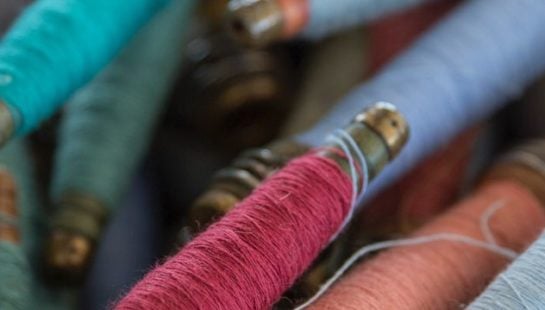Sahima’s Story: Just One Of Many
When Sahima* sits at her machine and spins cotton into thread, she often thinks about the clothes each strand will become, and the people who will wear them.
The 30-year-old mum in Bangladesh takes pride in her work, but it doesn’t pay enough to keep her family out of poverty.
‘With my earnings, I cannot manage the children’s education or proper meals,’ she said. ‘Sometimes I need to get a loan to buy medicine.’
There are also serious risks, no compensation for injuries, and a fear of being reprimanded if they speak up. The machines in her factory never sleep, with shifts of workers constantly meeting orders from fashion brands. If cotton gets stuck or thread is torn, the workers must fix the problem while the machines run at high speed.
‘A few days ago, a girl’s wrist got sucked inside the machine,’ Sahima said. ‘She was about 14 years old. My daughter’s age.’
The Ugly Side To The Fashion Industry
Sahima is not alone. Behind the glistening shop fronts, there is an ugly side to the fashion industry. Many of the 94 million garment workers who make our clothes—particularly women in Bangladesh, China, India and South-east Asia—work in unsafe conditions without basic rights like maternity or sick leave.
More fundamentally, they are not paid enough to live on. Many garment workers around the world are denied a living wage, which is the amount a worker needs to cover their family’s living expenses, such as food and housing.
As fashion brands vie for the cheapest source of labour, the city’s 4.5 million garment workers barely earn enough to survive.
In places where cotton is picked, thread is spun and fabric stitched into clothes, most workers earn a minimum wage far below a living wage. Workers in Dhaka, Bangladesh’s capital, typically earn the equivalent of $114 AUD a month—less than a third of the living wage†. As fashion brands vie for the cheapest source of labour, the city’s 4.5 million garment workers barely earn enough to survive.
What Does The Bible Say About This?
‘Countries keep minimum wages low, as apparel production is competitive to deliver cheap prices to shoppers and their economy relies on business with garment suppliers,’ said Sarah Knop, Baptist World Aid’s Corporate Advocacy Lead. ‘This means many people feel compelled to work overtime, 80 hours or more a week just to feed their families.’
‘Without a living wage, garment workers are faced with severe economic injustice.’
Yet Sarah points out that God is not silent on this issue. Deuteronomy 24:14 commands, ‘do not take advantage of a hired worker who is poor’, while James 5:4 condemns exploitative employers: ‘the wages you failed to pay the workers who mowed your fields are crying out against you.’
‘When skilled, experienced workers are denied fair pay, they are denied their human dignity,’ Sarah added. ‘The things God declares as good—times of rest, enjoying the fruits of labour, providing for your children—struggle to find their full expression under exploitation.’
Shedding Light On The Fashion Industry
That’s why Baptist World Aid helps companies ensure workers in their supply chains have rights like adequate pay and safe working conditions. The 2022 Ethical Fashion Report found nine per cent of companies could demonstrate paying living wages in some final stage factories, but only one per cent could demonstrate payment in all final stage factories.
‘Reporting on companies’ progress towards paying a living wage is vital, so that shoppers can make informed purchasing decisions,’ Sarah said.
Sahima is also acting for change. Her fellow workers are like family, and she helps others when they can’t fulfil their orders in time. She sends her children to our Partner’s Child Club, and her teenage daughter now advocates for women’s rights at school. Sahima’s hope, while persevering through unfair working conditions, is that one day her children won’t have to.
Want to buy from brands that pay a living wage? Use our Ethical Fashion Guide to find out who is protecting workers and the environment. If your favourite brand could be doing better, let them know.
*Name changed for privacy reasons
†As of October 2023, Dhaka’s living wage is 25,497 Tk or $365.55 AUD (Anker Living Wage and Living Income Research Institute, the Global Living Wage Coalition)



 Peter Keegan,
Peter Keegan,

 Eliza Johnson
Eliza Johnson